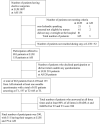Symptoms of anxiety and depression in surgical patients at the hospital, 6 weeks and 6 months postsurgery: A questionnaire study
- PMID: 33318829
- PMCID: PMC7729539
- DOI: 10.1002/nop2.620
Symptoms of anxiety and depression in surgical patients at the hospital, 6 weeks and 6 months postsurgery: A questionnaire study
Abstract
Aims: To describe prevalence of symptoms of anxiety and depression in surgical patients at three time points: at hospital postsurgery (T1), 6 weeks (T2) and 6 months (T3) postdischarge from hospital; and detect situations and experiences that predict symptoms of anxiety and depression at T2 and T3.
Design: Prospective, explorative two-site follow-up study.
Methods: Patients having selected surgeries from January-July 2016 were invited to participate. Final participation was 390 patients. Participation involved answering questionnaires, including the Hospital Anxiety and Depression Scale (HADS). A stepwise multiple linear regression model was employed to calculate predictors of anxiety and depression.
Results: The proportion of patients presenting with moderate-to-severe anxiety or depression ranged from 5.4%-20.2% at different times. Major predictors of anxiety at both times were not feeling rested upon awakening and higher scores on HADS-Anxiety at T1 and T2 and at T2 also experiencing more distressing postoperative symptoms. For depression, the major predictors were at both times higher scores on HADS-Depression at T2 and T3 and also at T2 not feeling rested upon awakening and at T3 reporting delayed or very delayed recovery.The four models explained from 43.9%-55.6% of the variance in symptoms of anxiety and depression. Our findings show that patients presenting with psychological distress at the hospital are in a vulnerable position. Also, that benefits of good sleep during the recovery should be emphasized during hospital stay.
Keywords: anxiety; depression; nursing; perioperative care; surgical patients.
© 2020 The Authors. Nursing Open published by John Wiley & Sons Ltd.
Conflict of interest statement
The authors have declared no conflicts of interest.
Figures
Similar articles
-
Predictors of psychological distress in patients at home following cardiac surgery: an explorative panel study.Eur J Cardiovasc Nurs. 2012 Sep;11(3):339-48. doi: 10.1016/j.ejcnurse.2011.06.004. Epub 2012 Apr 4. Eur J Cardiovasc Nurs. 2012. PMID: 21763204
-
Health related quality of life in patients having total knee replacement and associations with symptoms, recovery, and patient education: A six month follow up study.Int J Orthop Trauma Nurs. 2021 Jul;42:100830. doi: 10.1016/j.ijotn.2020.100830. Epub 2020 Nov 2. Int J Orthop Trauma Nurs. 2021. PMID: 33518438
-
A longitudinal study on anxiety, depressive and adjustment disorder, suicide ideation and symptoms of emotional distress in patients with cancer undergoing radiotherapy.J Psychosom Res. 2016 Aug;87:14-21. doi: 10.1016/j.jpsychores.2016.05.010. Epub 2016 Jun 1. J Psychosom Res. 2016. PMID: 27411747
-
Anxiety and depressive symptoms, and stress biomarkers in pregnant women after in vitro fertilization: a prospective cohort study.Hum Reprod. 2018 Jul 1;33(7):1237-1246. doi: 10.1093/humrep/dey109. Hum Reprod. 2018. PMID: 29796614
-
Does Rotator Cuff Repair Improve Psychologic Status and Quality of Life in Patients With Rotator Cuff Tear?Clin Orthop Relat Res. 2015 Nov;473(11):3494-500. doi: 10.1007/s11999-015-4258-1. Clin Orthop Relat Res. 2015. PMID: 25791445 Free PMC article.
Cited by
-
Clinical outcome and risk factors for subcutaneous emphysema in patients with lung cancer after video-assisted thorascopic surgery.Front Surg. 2022 Sep 2;9:956431. doi: 10.3389/fsurg.2022.956431. eCollection 2022. Front Surg. 2022. PMID: 36117818 Free PMC article.
-
Comparative Efficacy of Video Games Versus Midazolam in Reducing Perioperative Anxiety in Pediatric Patients: Systematic Review and Meta-Analysis.JMIR Serious Games. 2025 Mar 10;13:e67007. doi: 10.2196/67007. JMIR Serious Games. 2025. PMID: 40063979 Free PMC article.
-
Psychological Consequences Associated With Coronary Artery Bypass Graft Surgery: A Bibliometric Analysis.Cureus. 2022 Sep 19;14(9):e29331. doi: 10.7759/cureus.29331. eCollection 2022 Sep. Cureus. 2022. PMID: 36277553 Free PMC article. Review.
-
Patients' expectations and experiences of provided surgery-related patient education: A descriptive longitudinal study.Nurs Open. 2022 Sep;9(5):2495-2505. doi: 10.1002/nop2.1270. Epub 2022 Jun 5. Nurs Open. 2022. PMID: 35666048 Free PMC article.
-
Preoperative predictors of acute postoperative anxiety and depression using ecological momentary assessments: a secondary analysis of a single-centre prospective observational study.Br J Anaesth. 2025 Jan;134(1):102-110. doi: 10.1016/j.bja.2024.08.035. Epub 2024 Oct 24. Br J Anaesth. 2025. PMID: 39455306
References
-
- WHO (2017). Depression and Other Common Mental Disorders: Global Health Estimates. Geneva: World Health Organization; Licence: CC BY‐NC‐SA 3.0 IGO. Retrieved from http://www.who.int/mental_health/management/depression/en/. Retrieved October 10th 2018.
-
- REDCap (nd). REDCap Research Electronic Data Capture. Retrieved from https://redcapinfo.ucdenver.edu/. Retrieved October 10th 2018.
-
- Basak, F. , Hasbahceci, M. , Guner, S. , Sisik, A. , Acar, A. , Yucel, M. , … Bas, G. (2015). Prediction of anxiety and depression in general surgery inpatients: A prospective cohort study of 200 consecutive patients. International Journal of Surgery, 23, 18–22. 10.1016/j.ijsu.2015.09.040 - DOI - PubMed
Publication types
MeSH terms
LinkOut - more resources
Full Text Sources
Medical



